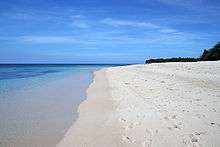beach
English

Etymology
From Middle English bache, bæcche (“bank, sandbank”), from Old English bæċe, beċe (“beck, brook, stream”), from Proto-Germanic *bakiz (“brook”), from Proto-Indo-European *bʰog- (“flowing water”). Cognate with Dutch beek (“brook, stream”), German Bach (“brook, stream”), Swedish bäck (“stream, brook, creek”). More at batch, beck.
Pronunciation
- (US) IPA(key): /bit͡ʃ/
Audio (US) (file) - (Received Pronunciation) IPA(key): /biːt͡ʃ/
Audio (UK) (file) - Rhymes: -iːtʃ
- Homophone: beech
Noun
beach (plural beaches)
- The shore of a body of water, especially when sandy or pebbly.
- 1913, Joseph C. Lincoln, chapter 1, in Mr. Pratt's Patients:
- Pretty soon I struck into a sort of path […]. It twisted and turned, […] and opened out into a big clear space like a lawn. And, back of the lawn, was a big, old-fashioned house, with piazzas stretching in front of it, and all blazing with lights. 'Twas the house I'd seen the roof of from the beach.
-
- A horizontal strip of land, usually sandy, adjoining water.
- 1988, Robert Ferro, Second Son:
- Up and down, the beach lay empty for miles.
-
- (Britain dialectal, Sussex, Kent) The loose pebbles of the seashore, especially worn by waves; shingle.
Synonyms
Derived terms
Translations
|
|
Verb
beach (third-person singular simple present beaches, present participle beaching, simple past and past participle beached)
- (intransitive) To run aground on a beach.
- 1941, Emily Carr, Klee Wyck, "Salt Water,"
- When we finally beached, the land was scarcely less wet than the sea.
- 1941, Emily Carr, Klee Wyck, "Salt Water,"
- (transitive) To run (something) aground on a beach.
- 1851, Herman Melville, Moby-Dick, Chapter 90,
- It seems that some honest mariners of Dover, or Sandwich, or some one of the Cinque Ports, had after a hard chase succeeded in killing and beaching a fine whale which they had originally descried afar off from the shore.
- 1974, Homer, Iliad, translated by Robert Fitzgerald, Doubleday, Book Two, lines 530-31, p. 53,
- Great Aías led twelve ships from Sálamis
- and beached them where Athenians formed for battle.
- 1851, Herman Melville, Moby-Dick, Chapter 90,
- (of a vehicle) To run into an obstacle or rough or soft ground, so that the floor of the vehicle rests on the ground and the wheels cannot gain traction.
Synonyms
Derived terms
Translations
|
|
French
Pronunciation
- IPA(key): /bitʃ/
Noun
beach m (plural beachs)
- (Congo) port where goods and passengers embark and debark
- 2006 March 14, Tshiala David, Baisse du trafic au beach Ngobila entre Kinshasa et Brazzaville, in Le Potentiel:
- C’est ainsi qu’elles ont décidé d’embarquer leurs marchandises dans des pirogues motorisés qui desservent les beachs privés entre les deux rives du fleuve Congo.
- (please add an English translation of this usage example)
- 2007, Jean-Alexis M'Foutou, La langue française au Congo-Brazzaville:
- Le Beach de Brazzaville hier réputé lieu de violence, de viols et de braquages, présent aujourd’hui des conditions de sécurité plutôt rassurantes.
- (please add an English translation of this usage example)
- 2006 March 14, Tshiala David, Baisse du trafic au beach Ngobila entre Kinshasa et Brazzaville, in Le Potentiel:
Irish
Etymology
From Old Irish bech, from Proto-Celtic *beko-, *bikos (compare Middle Welsh beg-egyr, byg-egyr (“drone”)), from Proto-Indo-European *bʰik-, *bʰoyk- (compare Czech včela, Latin fūcus), enlargement of *bʰey- (compare Welsh by-daf (“beehive”), English bee).
Pronunciation
- IPA(key): /bʲax/
Declension
Second declension
|
Bare forms
|
Forms with the definite article
|
Derived terms
- beachadóireacht
- beachaire
- beach bhaile
- beach chapaill, beach ghabhair
- beach fhiáin
- beachlann
- beach mheala
- beachóg
- beach oibre
- coirceog bheach
- gliú beach
Mutation
| Irish mutation | ||
|---|---|---|
| Radical | Lenition | Eclipsis |
| beach | bheach | mbeach |
| Note: Some of these forms may be hypothetical. Not every possible mutated form of every word actually occurs. | ||
Further reading
- "beach" in Foclóir Gaeilge-Béarla, An Gúm, 1977, by Niall Ó Dónaill.
- “bech” in Dictionary of the Irish Language, Royal Irish Academy, 1913–76.
Scottish Gaelic
.jpg)
Bee on flower
Etymology
From Old Irish bech, from Proto-Celtic *beko-, *bikos, from Proto-Indo-European *bʰik-, *bʰoik-, enlargement of *bʰī-, *bʰei-.
Pronunciation
Synonyms
- seillean (“bee”)
Derived terms
- beachach
- beachaid
- beachair
- beachan
- beach-chapaill
- beach-each
- beach-eòlais
- beach-gobhair
- beach-lann
- beach-mór
- beach-nuadh boireann
- beach-thaigh
- coinnspeach
- conas-beach
Mutation
| Scottish Gaelic mutation | |
|---|---|
| Radical | Lenition |
| beach | bheach |
| Note: Some of these forms may be hypothetical. Not every possible mutated form of every word actually occurs. | |
References
- Faclair Gàidhlig Dwelly Air Loidhne, Dwelly, Edward (1911), Faclair Gàidhlig gu Beurla le Dealbhan/The Illustrated [Scottish] Gaelic-English Dictionary (10th ed.), Edinburgh: Birlinn Limited, →ISBN
- Etymological Dictionary of the Gaelic Language, Alexander MacBain, Eneas Mackay, 1911
- “bech” in Dictionary of the Irish Language, Royal Irish Academy, 1913–76.